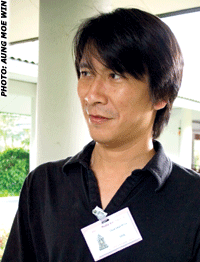Magazine
COVER STORY
The Faces of Burma 2005
By The Irrawaddy
DECEMBER, 2005 - VOLUME 13 NO.12
(Page 8 of 13)
The young entrepreneur, still in his early 40s, is widely respected for his innovative ideas and management skills.
In contrast to many other Burmese media groups and journals, Than Htut Aung invests heavily in human assets, offering unprecedented salaries of up to $200 a month to his journalistic staff, and unleashing a big debate on pay conditions in Rangoon media circles.
Reporters from the Eleven Media Group travel as a matter of routine with the national football team wherever it plays, publishing first-hand reports on its matches. Than Htut Aung’s own articles, printed under the pseudonym Man Ball-Lone, are particularly popular.
Burma’s inveterate gamblers like the group’s soccer journals because of their in-depth coverage and uncannily accurate predictions of international match results.
“The popularity of First Eleven lies in its relatively correct predictions of the possible outcomes of soccer games in Europe, and the journal has become a gambler’s handbook,” said one young businessman and regular reader.
Than Lwin Htun [Journalist]
While working part-time for the BBC Burmese Service in the 1990s, Than Lwin Htun heard about a Burmese student activist who had committed suicide in Thailand because of depression. The needless death struck a chord, and Than Lwin Htun used his radio show to play motivational Burmese songs and offer words of encouragement to listeners.
 As the program ended, Than Lwin Htun felt satisfied with what he had done. The British chief of the Service, however, did not. Than Lwin Htun was given a stern warning for breaching journalism’s code of professionalism and ethics.
As the program ended, Than Lwin Htun felt satisfied with what he had done. The British chief of the Service, however, did not. Than Lwin Htun was given a stern warning for breaching journalism’s code of professionalism and ethics.“I was so upset, and that feeling lingered for some years,” recalls Than Lwin Htun, who has now become the Burmese service chief of the Voice of America radio service. He later came to agree that he had gone beyond his professional boundaries. “I was overtaken with sentimental attachment and I politicized my show,” says Than Lwin Htun. Since then, Than Lwin Htun has striven to maintain absolute professionalism, though he admits the impossibility of complete detachment. “The passion must be there as a journalist,” he says. “It fires our work.”
Than Lwin Htun’s is one of the success stories among the generation of student activists from the pro-democracy uprising of 1988. When those thousands of people took to the streets to demand change back in 1988, final-year medical student Than Lwin Htun, who was known then as Aung Naing, was a leading member of an underground student union, where he worked together with Min Ko Naing and other activists. When the military retook Rangoon, students fled to the Thai-Burma border to set up paramilitary organizations, Than Lwin Htun emerging as a founding member of the All Burma Student Democratic Front.
His underground activism did not last long, however, and in 1991 he resettled in London and began working for the BBC. He stayed with the Corporation until 2002, though found most pleasure in his advisory capacity at Thai-based Internews, a non-profit group which trains young journalists. As an Internews Burma Project trainer during 2002 and 2003, Than Lwin Htun helped to train more than 10 exiled Burmese groups.
“It was an awakening for many young people in exile, as they all thirst for journalism knowledge,” he says. “It was a most exciting time for me too, as I felt I could contribute to their needs.” Than Lwin Htun went on to help found the Internews Journalism School in Chiang Mai, Thailand, where students from diverse backgrounds can receive valuable training.
Than Lwin Htun moved to the US in early 2004, where he worked as program coordinator at VOA’s Burmese radio service. He became Service Chief in May 2005, helping to reinvigorate the station, which had long been known for its staid, old-fashioned approach to covering news.
The Burmese junta is never slow to point the finger at the BBC and VOA as culprits for their country’s instability.
« previous 1 | 2 | 3 | 4 | 5 | 6 | 7 | 8 | 9 | 10 | 11 | 12 | 13 next page »
more articles in this section
